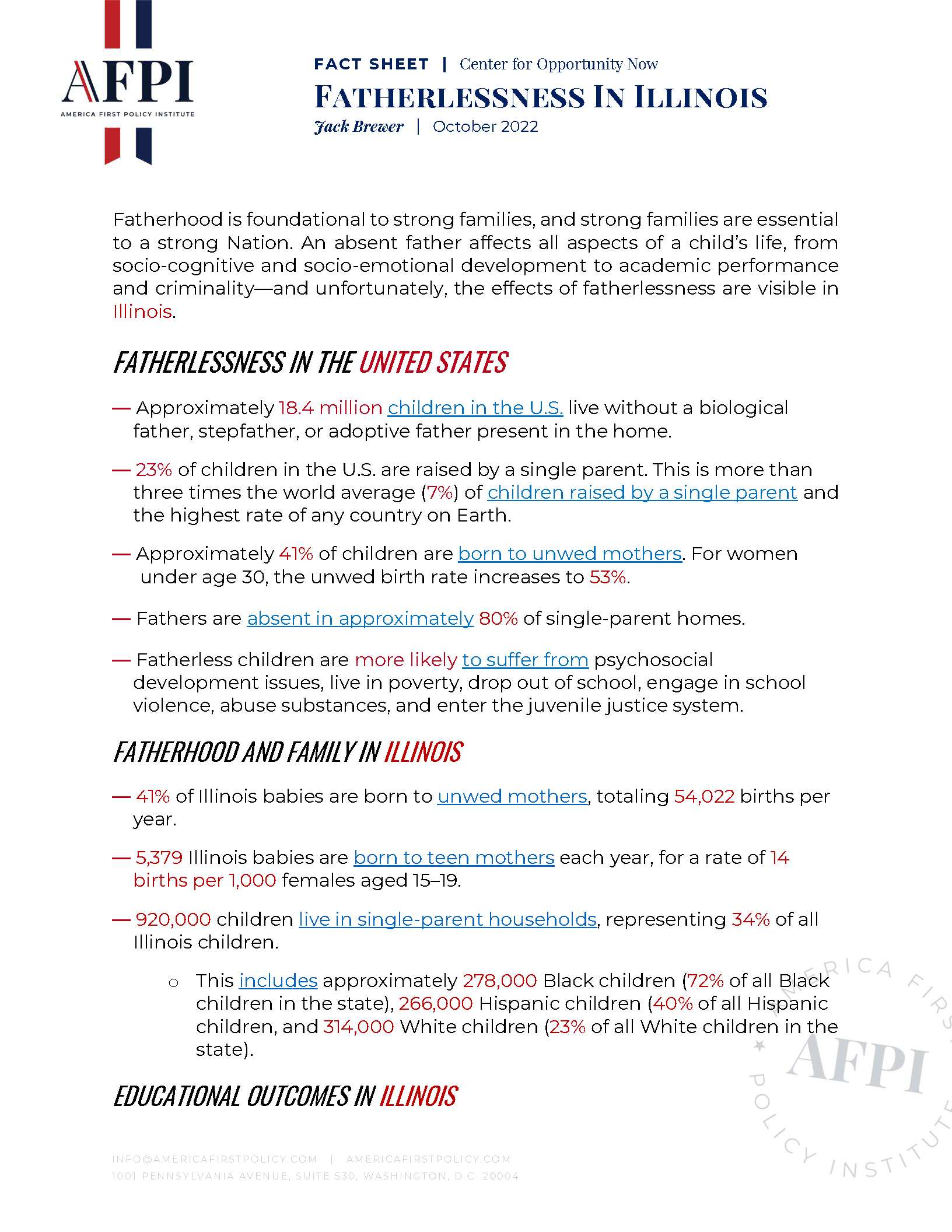Fatherlessness In Illinois
Fatherhood is foundational to strong families, and strong families are essential to a strong Nation. An absent father affects all aspects of a child’s life, from socio-cognitive and socio-emotional development to academic performance and criminality—and unfortunately, the effects of fatherlessness are visible in Illinois.
FATHERLESSNESS IN THE UNITED STATES
— Approximately 18.4 million children in the U.S. live without a biological father, stepfather, or adoptive father present in the home.
— 23% of children in the U.S. are raised by a single parent. This is more than three times the world average (7%) of children raised by a single parent and the highest rate of any country on Earth.
— Approximately 41% of children are born to unwed mothers. For women under age 30, the unwed birth rate increases to 53%.
— Fathers are absent in approximately 80% of single-parent homes.
— Fatherless children are more likely to suffer from psychosocial development issues, live in poverty, drop out of school, engage in school violence, abuse substances, and enter the juvenile justice system.
FATHERHOOD AND FAMILY IN ILLINOIS
— 41% of Illinois babies are born to unwed mothers, totaling 54,022 births per year.
— 5,379 Illinois babies are born to teen mothers each year, for a rate of 14 births per 1,000 females aged 15–19.
— 920,000 children live in single-parent households, representing 34% of all Illinois children.
- This includes approximately 278,000 Black children (72% of all Black children in the state), 266,000 Hispanic children (40% of all Hispanic children, and 314,000 White children (23% of all White children in the state).
EDUCATIONAL OUTCOMES IN ILLINOIS
— 66% of Illinois 4th-graders scored “below proficient” in reading for their class level.
— 66% of Illinois 8th-graders scored “below proficient” in mathematics for their class level.
— 24% of Illinois 4th-graders are considered “chronically absent” from school.
— 14% of Illinois high school students do not graduate on time.
CHILDREN’S HEALTH OUTCOMES IN ILLINOIS
— 581,409 Illinois children have one or more emotional, behavioral, or developmental conditions, representing 24% of all children in Illinois.
— 212,845 Illinois teens have anxiety or depression, representing 9% of all teens in Illinois.
— 48% of Illinois children and teens do not get regular exercise or vigorous physical activity.
— 42,000 of Illinois teens report dependence on illicit drugs or alcohol each year.
JUVENILE CRIME IN ILLINOIS
— 36,154 juveniles are arrested in Illinois each year.
— 834 Illinois youths reside in juvenile detention, correctional, or residential facilities.
CHILD OUTCOMES IN CHICAGO
— 341,382 students are enrolled in Chicago public schools, and 90% of those students are minorities.
— 25% of students test at or above the proficiency level for reading, and 21% test at that level for math.
— 8 out of 10 Black births in Chicago are to unwed mothers.
— 33% of all families in Chicago are led by single parents.
— White students graduate from a 4-year university in Chicago at nearly twice the rate of Black students (73% vs. 37%).
— Employed Black young adults aged 20–24 in Chicago earn an average of $14,000 per year, compared to an average of $34,000 per year for White young adults.
— Nearly 50,000 Chicago youth aged 16–24 are neither working nor in school, which is about 15% of all Chicago youth.
